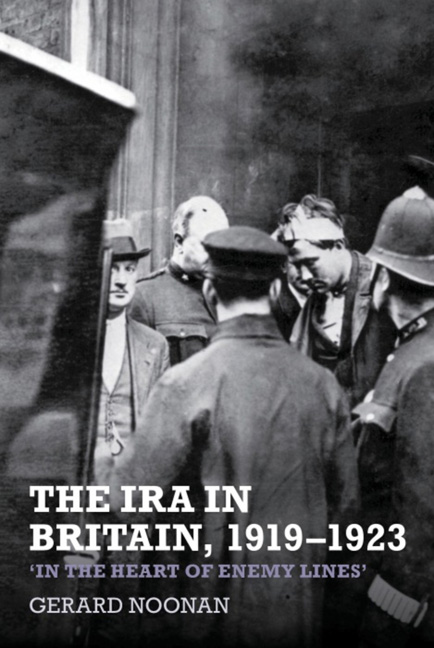Book contents
- Frontmatter
- Contents
- List of Illustrations
- List of Tables
- List of Graphs
- List of Abbreviations
- Acknowledgements
- Introduction
- Prologue
- 1 ‘On a Solid Footing’: Organizing Republicanism in Britain, January 1919–July 1921
- 2 Supplying an Army: Gunrunning in Britain, January 1919–July 1921
- 3 ‘We are doing what you are doing in Ireland’: IRA Operations in Britain, January 1919–July 1921
- 4 Truce, Treaty and Dissension, July 1921–June 1922
- 5 The Civil War, June 1922–May 1923
- 6 Combating the ‘Sinn Fein Movement’ in Britain: The Response of the Authorities, 1919–1923
- Epilogue and Conclusion
- Select Bibliography
- Index
1 - ‘On a Solid Footing’: Organizing Republicanism in Britain, January 1919–July 1921
- Frontmatter
- Contents
- List of Illustrations
- List of Tables
- List of Graphs
- List of Abbreviations
- Acknowledgements
- Introduction
- Prologue
- 1 ‘On a Solid Footing’: Organizing Republicanism in Britain, January 1919–July 1921
- 2 Supplying an Army: Gunrunning in Britain, January 1919–July 1921
- 3 ‘We are doing what you are doing in Ireland’: IRA Operations in Britain, January 1919–July 1921
- 4 Truce, Treaty and Dissension, July 1921–June 1922
- 5 The Civil War, June 1922–May 1923
- 6 Combating the ‘Sinn Fein Movement’ in Britain: The Response of the Authorities, 1919–1923
- Epilogue and Conclusion
- Select Bibliography
- Index
Summary
I
Following their release in late 1916 and 1917, the Easter Rising veterans were intent on continuing militant opposition to British rule in Ireland. They therefore quickly set to work re-organizing the republican movement. However, the war of independence had almost broken out in January 1919 before similarly serious efforts began in Britain. IRA GHQ ‘fully realise the necessity of making provision in countries outside Ireland’, declared Michael Collins, commending recruitment activities in Scotland.1 This chapter examines the means by which republicanism established itself in Britain and the fortunes it enjoyed there. Through an in-depth discussion of organizing efforts in Glasgow, section II provides an insight into the creation of Volunteers units in Britain. Section III introduces the main people involved in republican affairs. Section IV describes the means by which IRA units were founded and the roles of the IRB, the Cumann na mBan and Na Fianna Éireann. Sections V, VI and VII discuss the milieu in which these organizations existed, the type of people who became members and their motivations for joining. Section VIII focuses on how IRA units were run, while section IX concludes.
II
Sometime around 21 January 1919, Joseph Vize, the newly appointed Irish Volunteer organizer in Scotland, wrote to Michael Collins from Glasgow. There, he had found two Volunteer companies riven with animosities. ‘A’ Company, he reported, was ‘composed of a good number of undesirables and mixed citizen army & vol[unteer]s. trying to run the whole movement here’. It thus constituted a dangerous impediment to the development of the Volunteer organization in Scotland's biggest city. ‘B’ Company, however, proved more promising even though its members were somewhat disordered and frustrated by ‘little differences between themselves’. He wrote to Collins:
I am happy to report that I have re-organized B. [Company] by taking on myself the authority to issue a special mobilization order in the name of headquarters (Dublin [sic] and hope I have not done wrong in doing so,) and settled all little differences between them, had a meeting of about 60 members together, formed the company in sections, appointed N.C.O.s [i.e. Non-Commissioned Officers], and made same with Captains & Lieut[enant]s. into a committee for to carry on the company's work, the said committee are all of right type, so that B. Co[mpany].
- Type
- Chapter
- Information
- The IRA in Britain, 1919–1923‘In the Heart of Enemy Lines’, pp. 33 - 83Publisher: Liverpool University PressPrint publication year: 2014



